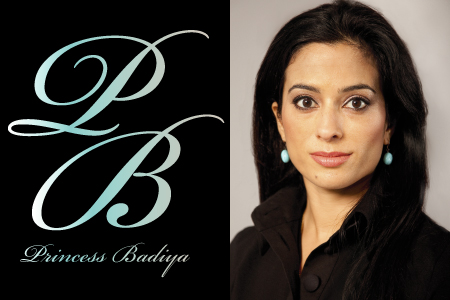
A feature interview with Princess Badiya of Jordan
Issue 75 December 2010
Princess Badiya embraces two worlds: the Jordan of her birth and the Britain of her education and marriage. Now Chairman of the mentoring charity Mosaic, the Princess talks frankly to Sarah Joseph in her first ever public interview.
It can be easy for members of royal families and the aristocracy to while away their time. Not so with Princess Badiya. Of course, she has impeccable manners, as one would expect; but she is not afraid to speak her mind and she has some deep-seated opinions. Though she is generally a very private person, she agreed to an interview with emel to promote Mosaic, the charity founded by Prince Charles, of which she is now Chairman. Mosaic is a Muslim-led charity mentoring young people and offering them positive role models.
Princess Badiya bint El Hassan is the youngest daughter of Prince El Hassan bin Talal of Jordan (brother of the late King Hussein). For the 36-year-old Princess, her family have been a huge influence. “My grandparents, parents, uncles and aunts have all been positive role models. I learnt from them almost by osmosis. Seeing strong women with strong opinions, but also seeing men like my father supporting women’s rights, I would not be the same without them. For them duty is second nature.”
Princess Badiya came to Britain as a teenager to attend boarding school in Dorset. Her parents sent her here to “ensure she did not become too spoilt in Jordan.” She describes her boarding school days as happy, but notices things have become more complicated since then. “When I was at school in England, there was the odd comment about being Arab or ‘Paki’ but being Muslim was not the issue. However, when a Jordanian friend’s young daughter started school here, she received jibes such as, ‘Hey, will you blow up the school?’ from a few of the girls, whilst at the same time some British Muslim girls demanded she prove her Muslim credentials and show them her prayer mat and Qur’an. Fortunately, she knows who she is and is not prepared to deny or exaggerate her identity for anyone.”
Having read History at Christ Church, Oxford University, Princess Badiya then went on to qualify as a barrister in 1998, and met her future husband, Khaled Edward Blair, in the process. “He became a Muslim before we married, but I was adamant that Ed’s conversion should be out of genuine religious conviction and not because of me. Would Ed have become a Muslim if he had never met me? Maybe not, it may not have occurred to him to look into it. As it was, he studied Islam and found that it was what he believed in already.”
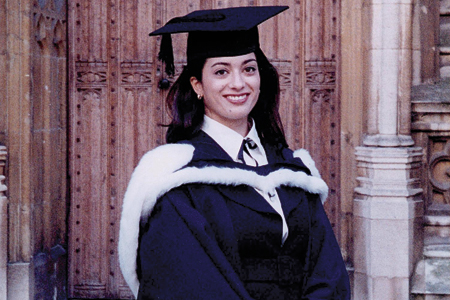
Princess Badiya graduated in History from Christ Church Oxford, 1995
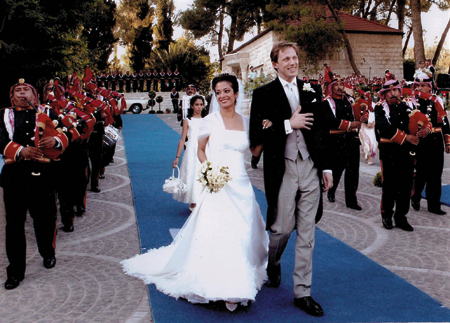
Marriage to Khaled Edward Blair, Jordan, 2005
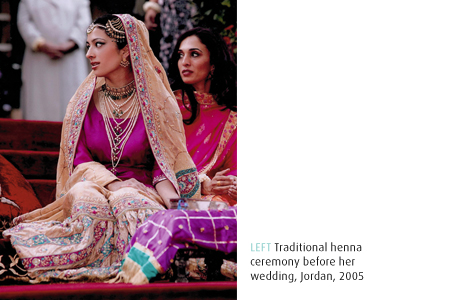
As we enter deeper into our discussions, the Princess is keen to point out that her views are just that: her views, “Given my position, I have to emphasise when I am speaking as an individual, not as a representative.” We discuss the way Muslims are portrayed. “I resent the ‘guilty until proven innocent’ perception that often hangs over the heads of Muslims today, where you have to say the right thing clearly and loudly so others can relax and think ‘Oh, okay – we’re dealing with the right sort of Muslim.’ Islam is about moderation but the term ‘moderate Muslim’ can suggest you are moderate about your commitment to being a Muslim. If I believe in women’s rights or condemn suicide bombings or show respect for those of other faiths, that’s not me being a ‘moderate’ or ‘liberal’ Muslim. It’s actually me just being a Muslim, because that’s what I learnt from reading the Qur’an and from the example of the life of the Prophet Muhammad.”
As we discuss the perceived Muslim anger, she is at pains to present different sides of the discourse. “Muslims are not a monolith; the Ummah is a beautiful concept- but we’re not all living the same experiences. If you look at the circumstances of so many Muslims in the world, they are part of the universal malaise of rich vs. poor. About seventy percent of the world’s refugees are Muslims. So many Muslims have to cope with genuine geopolitical, social and economic hardships which can lead to despair and even militancy. They are not ‘angry’ because they’re Muslims per se; but because of the situations of poverty and conflict in which they exist. The struggles that many face in the Muslim world are also a source of sympathy and anger for those who are better off. But, even though the better off Muslims, such as those in the UK, are not disenfranchised or living in abject poverty and/or conflict zones they can still face difficulties as Muslims, such as harassment in the streets, verbal abuse, discrimination, bad airport experiences etc. All this combines to make Muslims feel they are being targeted.”
“And, of course, what is going on in Gaza, in Afghanistan, Iraq; the horrors of Abu Ghraib, Guantanamo; extraordinary rendition, the gratuitous provocations of the Danish cartoons, the irresponsible, attention-seeking policies of certain lowly politicians - all of these combine to fuel the flames of Muslim anger around the Ummah, and also to give the impression that there is an embittered ‘Muslims versus the West’ conflict.”
On this last point, the Princess stresses that it is not an apocalyptic ‘Muslim versus the West’ conflict as Muslims are not alone in facing those problems, nor are they at all united in their response to them. “Many from wider society support Muslims and sympathise with these issues. You can see this, for example from the huge peaceful demonstrations about Iraq and Palestine, and you can hear this from the intellectuals and members of the judiciary who speak out against these sorts of problems. They do this out of sympathy and support for us as fellow human beings, but also because many of them feel that this degradation of human rights is affecting the deeply cherished principles of Western democracy – the rule of law, right to life, liberty, due process, etc. So, we are not on our own as Muslims, and we should remember that and act accordingly otherwise it becomes a self-fulfilling prophecy.”
“Don’t forget that Muslims are also angry with each other. The peaceful majority just want to get on with things and live their lives and not be told how to behave as Muslims by anyone, and not be held responsible for the acts of the belligerent/militant few.”
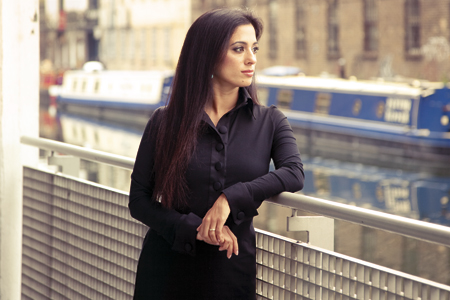
The Princess is also impassioned about Muslims taking responsibility. “We’re very quick to get upset when we’re being treated badly, but I don’t see the same level of protest when Muslims treat non-Muslims badly; for example when Christians are murdered in Iraq or Pakistan, where are the furious demonstrations? And what about when it’s Muslims against Muslims? Where’s the outrage when it comes to non-Arab Sudanese being massacred in Darfur? Where is the outrage about the Sunni-Shi’a bloodbaths? We’re good at complaining when it’s the ‘non-Muslim Westerner’ who we see as being the perpetrator, but we’re very reluctant to take responsibility for ourselves. You have people saying, ‘We can’t get ahead in the UK because we’re Muslims,’ despite the many opportunities here. But where’s the protest at the treatment of ‘guest workers’ in certain countries of the Gulf? We have to be self-aware, we have to be balanced and not just develop a victim-complex.”
Victim complex is a problem for Princess Badiya, and so too is the defensive rhetoric used to dispel the perception that Muslims are “problem people”, “If you are under suspicion, you react defensively perhaps even defiantly. But there is a danger that if you start defining yourself in opposition to something and so exaggerating aspects of your identity, you risk distorting what it is you are really about and losing the essence of the identity you are trying to preserve. If you’re busy being upset and defensive, you can overlook the wonderful positives of being a Muslim” And for Princess Badiya there is so much that is inspirational and joyful about being a Muslim, “Islam teaches us to be open to the world, to learn from and interact with others, to be helpful, respectful members of a community.” And she warns that, “Those who think hatred and isolation are necessary to maintain the purity of their faith, actually risk not being faithful to the fundamentals of Islam.”
“We need to be engaged as active citizens, not just on ‘Muslim issues’ but on our shared values, shared citizenship and our shared concerns as human beings.” Her perspectives on such shared values are a strong motivation for her work in Mosaic, for whilst Mosaic is Muslim-led, it is not just ‘by Muslims and for Muslims’. “We’re a Mosaic on so many different levels. We try to reflect the fact that Britain itself is a mosaic. We’re a mosaic in terms of a network between organisations and a network between Muslims and between all people. As well as offering opportunities to young people, we also want to try and help them to thrive in an integrated society.”
With an Arab father, a Pakistani mother, an English husband and living between Jordan and London, Princess Badiya recognises not only the diversity of cultural expressions of Islam within the modern world, but also that her own identity is multi-layered. And so it is for the young Muslims she meets in Britain, “When I meet our Muslim volunteers in Bradford and Birmingham, they’re so proud of their homes; they’re really attached to their city and their country. Try telling them they’re not British and they’d be incredibly offended.” The Princess acknowledges that issues of identity and citizenship are problematic for young Muslims today, but also feels it is not just about faith, “It’s not a problem with young Muslims only. In Britain there’s a general question mark over what role citizens should play, whether they are active citizens or just consumers.”
Mosaic was born out of Prince Charles’ very real concern for young people in the most disadvantaged areas of Britain, a large proportion of whom are Muslims. Such disadvantage exists alongside the reality of many Muslims who are also doing very well: Muslims are the fastest growing middle class. The Mosaic initiative brings the two together in a network of volunteers and mentors. Princess Badiya’s role with the charity began with “a very open conversation with the Prince of Wales, whose deep understanding of the issues and concern for those involved is extremely genuine and inspiring.” She was invited to attend formative meetings for Mosaic and various Mosaic events, then to join the Board and last summer, His Royal Highness appointed her Mosaic’s first Chairman.
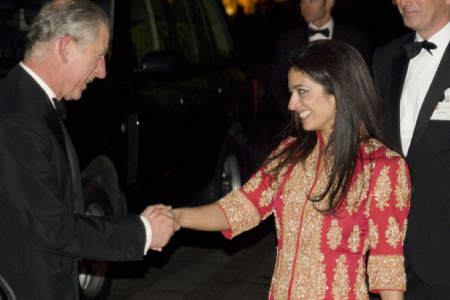
Princess Badiya with HRH The Prince of Wales at the Mosaic Talent Awards, 2008
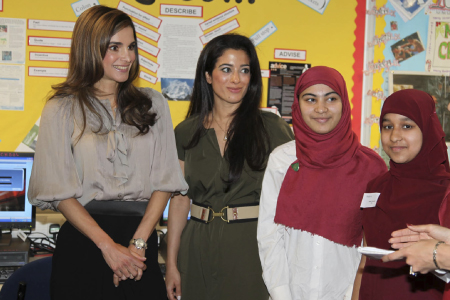
With HM Queen Rania of Jordan visiting Mulberry School for Girls in Tower Hamlets, 2009
Mosaic specialises in increasing opportunities for young people, particularly those living in areas of urban deprivation. It also seeks to raise their aspirations, self esteem and confidence, whilst providing role models who, according to the Princess, help because they are able to say, “‘I’m Muslim; I understand where you’re coming from. This is my story – I did well.’ But they can also sometimes say, ‘You know what? I’m Muslim too, stop using it as an excuse – let’s get on with things.’” The organisation also offers mentoring to mothers recognising that in order to raise the attainment of young girls, their mothers have to appreciate what is involved and be able to support their daughters.
In addition to their work in schools, the Princess feels Mosaic’s Young Offenders programme is of great importance, “The ‘shame culture’ often means that when young Muslims come out of prison they don’t find a support network waiting, and obviously this increases the risk of re-offending. Mosaic mentors go into prisons a few months before an offender’s release date, make contact, build a relationship and then they meet the ex offender at the prison gates. They make sure that they’ve got somewhere to go, try and help them find work and resettle, otherwise you don’t break the cycle.”
The Princess is proud of the many good news stories surrounding Mosaic. The Talent awards showcase examples of Muslims achieving in a variety of fields, “And they’re not compromising themselves as Muslims to do it.” So what have been the keys to Mosaic’s success? “That we were set up by the Prince of Wales gives us great credibility. And Mosaic doesn’t have a political or religious agenda, which some may find disappointing, but the fact that we are just about helping young people in the context of an integrated society really appeals to so many, as evidenced by the enormous volunteer support we have attracted.”
Mosaic has developed very, very quickly from its launch in 2007. “We hope to create a culture of volunteering, where, inshaAllah, the mentees of today will be the successful volunteers of tomorrow.”
Given her easy style, balanced and levelheaded responses, I can imagine that this will be the first in a long line of interviews for the Princess. She speaks her mind, but takes into consideration the views of others. She believes in being aggressively moderate. “We can’t leave it to the extremists on either side who shout the loudest to steal the show. I believe in speaking up, in trying to dispel the stereotypes and enlightening people about the many positives of being a Muslim, and the great contributions Muslims can and do make.” Her own strategy is quite simple; “If people ask me what I believe, then I am very happy to explain it to them. If people are trying to be offensive, I oblige by being offended, but I still explain.”
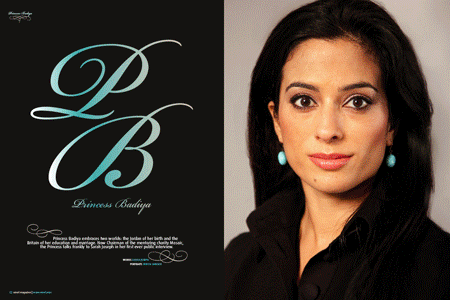
You can read the feature in its entirety by picking up a copy of the latest issue. Click here for details on how to subscribe.
Bookmark this |
|
Add to DIGG |
|
Add to del.icio.us |
|
Stumble this |
|
Share on Facebook |
|
Share this |
|
Send to a Friend |
|
Link to this |
|
Printer Friendly |
|
Print in plain text |
|

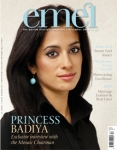
Comments
21 Comments
1
S. Longden
1 Jun 11, 14:39
“MOSAIC - a charity providing role models for young British Muslims!? Patron = royalty (admittedly British), Chair = royalty (Jordanian). CEO = Jonathan Freeman.
Not clear how Mosaic's target group - young, disaffected, predominately poor Muslims in the UK - are supposed to be inspired by this "Muslim led" organisation? I'd find it difficult to be inspired by leaders given (not elected) their positions based on the beds in which they were conceived.
Clearly though, the Princess's credentials to lead MOSAIC are based on her royal lineage - great granddaughter of Sherif Hussein ibn Ali, the Arab leader who allied with the British in WW1, leading to the defeat of the Ottoman Islamic Empire. Whilst this 'celebrated' family legacy no doubt endears her to HRH Prince of Wales, it may not go down quite so well with your average British Muslim.
Maybe she intends to promote her cousin's (King Abdullah II) autocratic, Jordanian style of government to British Muslims? Inspirational!
Page 1 of 2